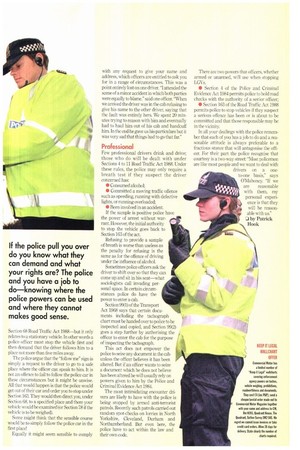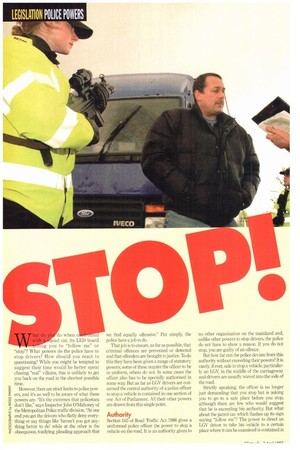If the police pull you over do you know what
Page 41

Page 40

If you've noticed an error in this article please click here to report it so we can fix it.
they can demand and what your rights are? The police and you have a job to do—knowing where the police powers can be used and where they cannot makes good sense.
do when cie uad car, its LED board ng you to "follow me" or "stop"? What powers do the police have to stop drivers? How should you react to questioning? While you might be tempted to suggest their time would be better spent chasing "real" villains, this is unlikely to get you back on the road in the shortest possible time.
However, there are strict limits to polic.e powers, and it's as well to be aware of what these powers are. "It's the extremes that policemen don't like," says Inspector John O'Mahoney of the Metropolitan Police traffic division. "At one end you get the drivers who flatly deny everything or say things like `haven't you got anything better to do' while at the other is the obsequious, toadying, pleading approach that we find equally offensive." Put simply, the police have a job to do.
That job is to ensure, as far as possible, that criminal offences are prevented or detected and that offenders are brought to justice. To do this they have been given a range of statutory powers; some of these require the officer to be in uniform, others do not. In some cases the officer also has to be specially authorised in some way. But as far as WV drivers are concerned the central authority of a police officer to stop a vehicle is contained in one section of one Act of Parliament. All their other powers are drawn from this single point.
Authority
Section 163 of Road Traffic Act 1988 gives a uniformed police officer the power to stop a vehicle on the road. It is an authority given to no other organisation on the mainland and, unlike other powers to stop drivers, the police do not have to show a reason. If you do not stop, you are guilty of an offence.
But how far can the police deviate from this authority without exceeding their powers? It is rarely, if ever, safe to stop a vehicle, particularly an LOV, in the middle of the carriageway and drivers are usually waved into the side of the road.
Strictly speaking, the officer is no longer just demanding that you stop but is asking you to go to a safe place before you stop, although there are few who would suggest that he is exceeding his authority. But what about the patrol car which flashes up its sign saying "follow me"? The power to direct an LOV driver to take his vehicle to a certain place where it can be examined is contained in Section 68 Road Traffic Act 1988—but it only relates to a stationary vehicle. In other words a police officer must stop the vehicle first and then demand that the driver follows him to a place not more than five miles away The police argue that the "follow me" sign is simply a request to the driver to go to a safe place where the officer can speak to him. It is not an offence to fail to follow the police car in these circumstances but it might be unwise. All that would happen is that the police would get out of their car and order you to stop under Section 163. They would then direct you, under Section 68, to a specified place and there your vehicle would be examined (or Section 78 if the vehicle is to be weighed).
Some might think that the sensible course would be to simply follow the police car in the first place!
Equally it might seem sensible to comply with any request to give your name and address, which officers are entitled to ask you for in a range of circumstances. This was a point entirely lost on one driver. "I attended the scene of a minor accident in which both parties were equally to blame." said one officer, "When we arrived the driver was in the alb refusing to give his name to the other driver, saying that the fault was entirely hers. We spent 20 minutes trying to reason with him and eventually had to haul him out of his cab and handcuff him. In the end he gave us his particulars but it was very sad that things had to go that far."
Professional
Few professional drivers drink and drive; those who do will be dealt with under Sections 4 to 11 Road Traffic Act 1988. Under these rules, the police may only require a breath test if they suspect the driver concerned has: • Consumed alcohol; • Committed a moving traffic offence such as speeding, running with defective lights, or running overloaded; • Been involved in an accident.
If the sample is positive police have the power of arrest without warrant. However, the initial authority to stop the vehicle goes back to Section 163 of the act.
Refusing to provide a sample of breath is worse than useless as the penalty for refusing is the same as for the offence of driving under the influence of alcohol.
Sometimes police officers ask the driver to shift over so that they can come up and sit in his seat—what sociologists call invading personal space. In certain circumstances police do have the power to enter a cab.
Section 99(1) of the Transport Act 1968 says that certain documents including the tachograph chart must be handed over to police to be inspected and copied, and Section 99(2) goes a step further by authorising the officer to enter the cab for the purpose of inspecting the tachograph.
This act does not empower the police to seize any document in the cab unless the officer believes it has been altered. But if an officer wants to seize a document which he does not believe has been altered he will usually rely on powers given to him by the Police and Criminal Evidence Act 1984, The most intimidating encounter drivers are likely to have with the police is being stopped by armed anti-terrorist patrols. Recently such patrols carried out random spot-checks on lorries in North Yorkshire, Cleveland, Durham and Northumberland. But even here, the police have to act within the law and their own code. There are two powers that officers, whether armed or unarmed, will use when stopping • Section 4 of the Police and Criminal Evidence Act 1984 permits police to hold road checks with the authority of a senior officer; • Section 163 of the Road Traffic Act 1988 permits police to stop vehicles if they suspect a serious offence has been or is about to be committed and that those responsible may be in the vicinity.
In all your dealings with the police remember that each of you has a job to do and a reasonable attitude is always preferable to a fractious stance that will antagonise the officer. For their part the police recognise that courtesy is a two-way street: "Most policemen are like most people and we want to deal with drivers on a oneto-one basis," says Mahoney. "If we are reasonable with them, my personal experience is that they will be reasonable with us."
by Patrick Hook












































































































